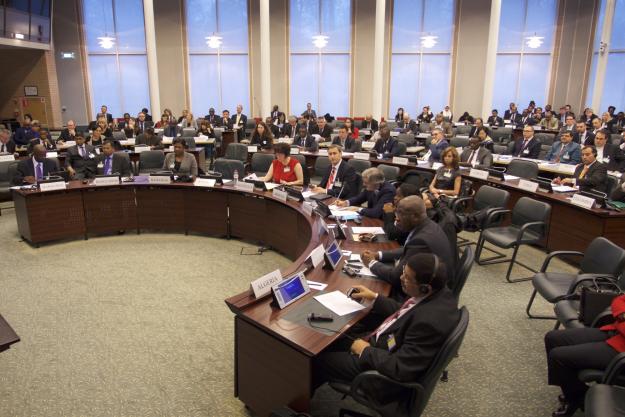
National Authorities from 114 States Parties at the Eighteenth Annual Meeting of National Authorities
National Authorities from 114 States Parties reviewed activities and best practices for the effective implementation of the Chemical Weapons Convention (CWC) at the Eighteenth Annual Meeting of National Authorities, held at the seat of the Organisation for the Prohibition of Chemical Weapons (OPCW) in The Hague from 23 – 25 November.
This annual meeting offers National Authorities (NAs) from across the world a forum where they can share experiences and lessons learned, expand their networks, and essentially deepen international cooperation.
During the meeting, OPCW Director-General, Ambassador Ahmet Üzümcü, emphasised National Authorities’ (NA) essential role in ensuring the full and effective implementation of the CWC and asked that they re-double their efforts in preventing the re-emergence of these weapons.
“States Parties will need to continue working together in finding effective solutions to emerging challenges and relying on the key norms enshrined in the Chemical Weapons Convention to do so,” Ambassador Üzümcü, observed.
Over the three-day gathering, more than 130 bilateral meetings were conducted between NA delegates and OPCW officials to address some of the ongoing challenges to implementation and possible ways of overcoming them.
This year’s agenda covered areas crucial to CWC implementation, such as: identification of declarable activities and resolving discrepancies in cross-border transfer of scheduled chemicals (Article VI), receiving inspections (Article VI), enacting national implementing legislation (Article VII), assistance and protection against chemical weapons (Article X), cooperation for the economic and technological development (Article XI), education and outreach, and scientific and technological advances.
Beyond these topics, regional groups also came together to discuss capacity building priorities and ways to foster sub-regional and regional cooperation.
The gathering was attended by 161 participants from all five OPCW regional groups: Africa, Asia, Eastern Europe, Latin America and the Caribbean, Western Europe and other States. Also in attendance were the Caribbean Community (CARICOM) and the Regional Arms Control Verification and Implementation Assistance Centre (RACVIAC) representatives.
Background
As the implementing body for the Chemical Weapons Convention, the OPCW oversees the global endeavour to permanently eliminate chemical weapons. Since the Convention’s entry into force in 1997 – with its 192 States Parties – it is the most successful disarmament treaty, eliminating an entire class of weapons of mass destruction.
To date, nearly 94 per cent of all chemical weapon stockpiles declared by possessor States have been destroyed under OPCW verification. For its extensive efforts in eliminating chemical weapons, the OPCW received the 2013 Nobel Prize for Peace.
